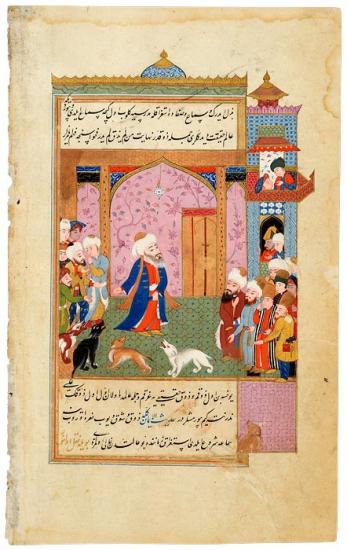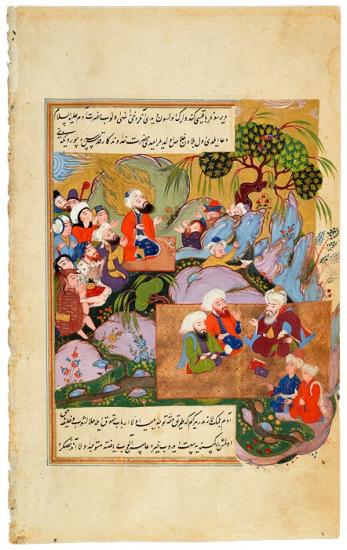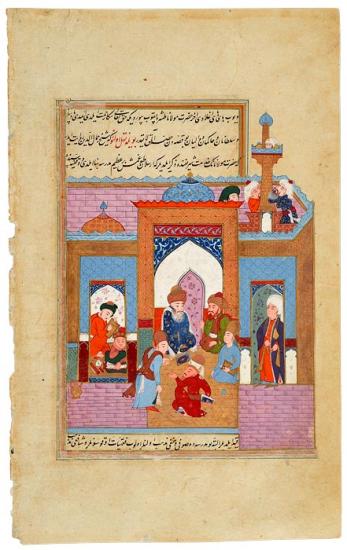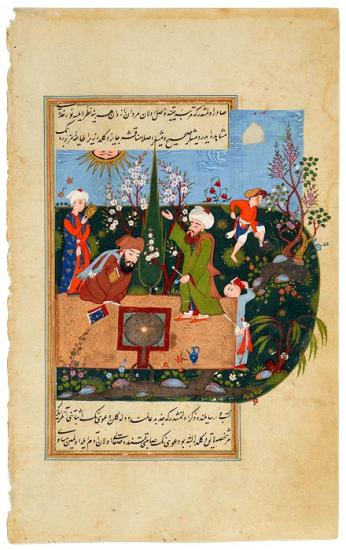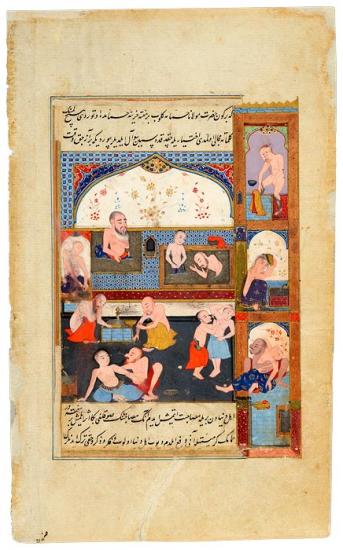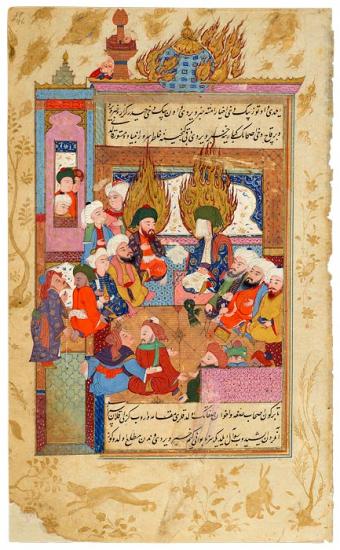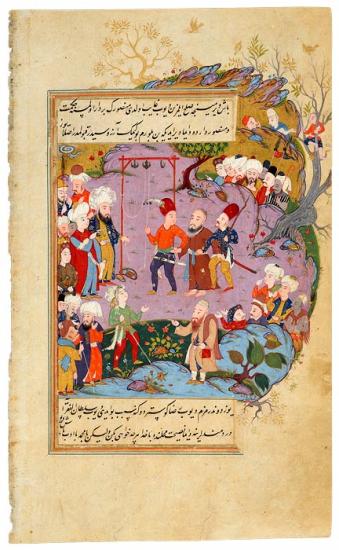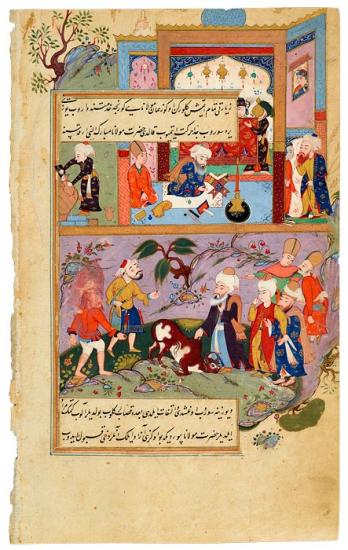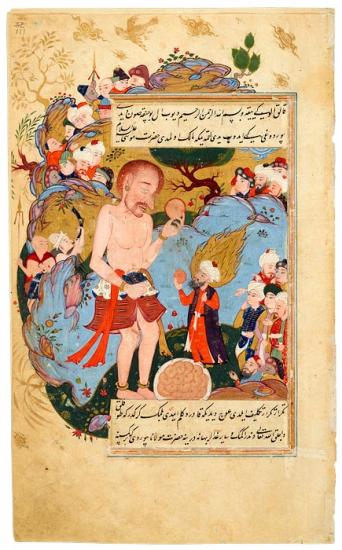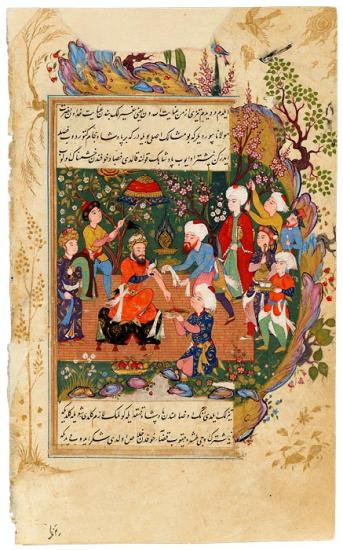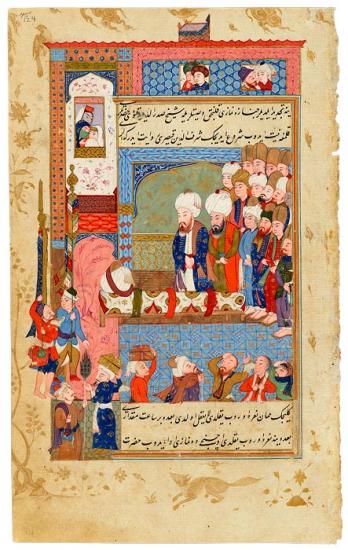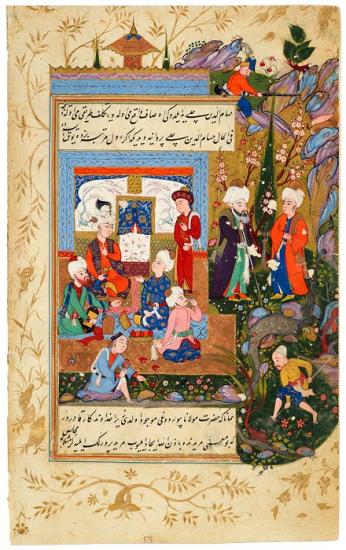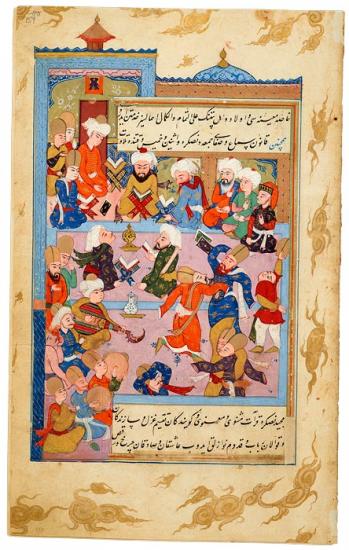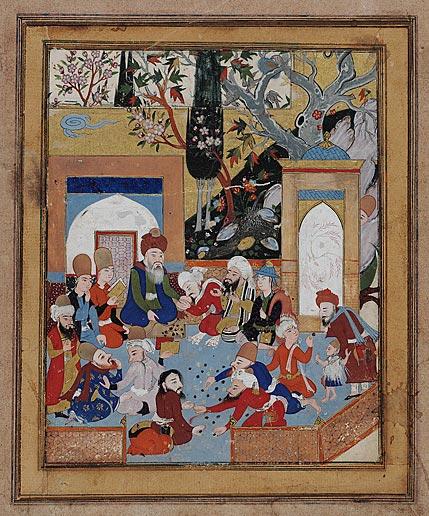The Seljuk Sultan& #39;s Courtier Disturbs Rūmī& #39;s Visit to his Father& #39;s Grave
Tarjuma-i Thawāqib-i manāqib ("A Translation of Stars of the Legend") is a manuscript translated into Turkish from Persian (Baghdad, 1590).
Thread on its miniatures depicting Rumi´s life.
Tarjuma-i Thawāqib-i manāqib ("A Translation of Stars of the Legend") is a manuscript translated into Turkish from Persian (Baghdad, 1590).
Thread on its miniatures depicting Rumi´s life.
Sermon by Rūmī
Rūmī is explaining the stories of the prophets Khiżr and Mūsā (Moses) to his followers. Shams al-Din, a druggist, notices that Khiżr, dressed in his traditional green and adorned with the flaming halo designating a prophet, is sitting near a door of the mosque.
Rūmī is explaining the stories of the prophets Khiżr and Mūsā (Moses) to his followers. Shams al-Din, a druggist, notices that Khiżr, dressed in his traditional green and adorned with the flaming halo designating a prophet, is sitting near a door of the mosque.
When the druggist grabs Khiżr& #39;s robe in order to make a request, Khiżr tells him that he, like the other prophets, should seek guidance from Rūmī. Khiżr is especially dear to the Sufis, who regard him as the initiator of those who walk the mystical path.
Three Saints Ask Rūmī for Permission to Take the Water Carrier of the Mevlevī Order with Them
According to the story, not found in Aflākī& #39;s original Persian text but added by the Turkish translator, a delegation of three saints, all dressed in green, have come to visit Rūmī.
According to the story, not found in Aflākī& #39;s original Persian text but added by the Turkish translator, a delegation of three saints, all dressed in green, have come to visit Rūmī.
They represent the forty saints that live in every generation, who, when one dies, choose a substitute. Here they ask Rūmī if they can take the water carrier of the Mevlevī order with them. The saints stand behind the water carrier, who holds the large bag made of animal skin.
Participating in Samā˓, Rūmī Stops His Ears Against the Cries of the Seljuq Sultan Rukn Al-Dīn Qlich
The Seljuq sultan Rukn al-Dīn Qilich Arslan IV chose a questionable spiritual guide over Rūmī. Some days later he is strangled by some of his emirs. At the moment of the...
The Seljuq sultan Rukn al-Dīn Qilich Arslan IV chose a questionable spiritual guide over Rūmī. Some days later he is strangled by some of his emirs. At the moment of the...
murder, Rūmī, places his forefingers in his ears, leading a prayer for the dead. Rūmī later explained that the sultan had pleaded for his help, but he didn´t want to hear him, saying that a man& #39;s fate could not be changed.
While the dervishes dance to the music of the flute and the tambourines, the noose is tightened around the sultan& #39;s neck.
Rūmī Summons Ḥamza, the Famous Flute Player, Back to Life
Ḥamza, the best flutist of the order, has just died. Rūmī raises the head of his corpse and miraculously restores him to life, saying, "My dear friend Ḥamza, arise!"
Ḥamza, the best flutist of the order, has just died. Rūmī raises the head of his corpse and miraculously restores him to life, saying, "My dear friend Ḥamza, arise!"
Ḥamza then replies, "Lo, here I am!" takes up his flute, and sustains a religious festival for three days and nights. About one hundred Greeks witness the event and are converted to Islam. When Rūmī leaves, life departs from Ḥamza as well.
Rūmī Leaves the Ḥalâwiyya Madrasa at Aleppo Followed by his Teacher Kamâl Al-Din Ibn Cadīm, Ruler of Aleppo
Some were jealous of the privilege Rūmī enjoyed at the school, complaining to the ruler of Aleppo that he often left his cell at midnight for some unknown, possibly...
Some were jealous of the privilege Rūmī enjoyed at the school, complaining to the ruler of Aleppo that he often left his cell at midnight for some unknown, possibly...
immoral, purpose. One night, after the gates miraculously open, as shown here, the teacher decides to follow Rūmī, urging the gatekeeper not to alert him. The teacher became disoriented, was discovered near death, recovered, and became a disciple of Rūmī.
Religious Dispute Between #Rumi and the Qadi Sirâj Al-Dīn Ormavī
The judge had rejected a certain fatwa (legal opinion) by Rūmī, but when the latter provided an exact textual reference, the judge fainted and became a follower.
The judge had rejected a certain fatwa (legal opinion) by Rūmī, but when the latter provided an exact textual reference, the judge fainted and became a follower.
A Young Merchant and #Rumi Follower Cures the Gravely Ill Frankish King in #Egypt
The merchant went to Egypt against Rumi´s advice, where he was imprisoned by the crusaders. He was able to heal the ailing king of the Franks.
The merchant went to Egypt against Rumi´s advice, where he was imprisoned by the crusaders. He was able to heal the ailing king of the Franks.
A Water Monster Begs #Rumi Wife to Intercede for Him
Outside Konya, Rūmī and his party camp by a river inhabited by [S]u Essā, "the lord of the water." Every year the monster drowns a person or animal from the neighboring community. After Rūmī jumped in the river to meet him...
Outside Konya, Rūmī and his party camp by a river inhabited by [S]u Essā, "the lord of the water." Every year the monster drowns a person or animal from the neighboring community. After Rūmī jumped in the river to meet him...
[S]u Essā wanted to change his ways. Not considering it proper to present himself to Rūmī, he asked Kerā Khātūn, Rūmī& #39;s second wife, to intercede on his behalf. The strategy worked: Rūmī forgave the monster, who then brought precious pearls to his wife.
Dogs in a Market Listen to #Rumi, Who Praises their Understanding and Attention
While dogs were generally not highly esteemed, Rūmī praises their understanding and attention, calling them "relatives of the dog of the Seven Sleepers" and reciting a distich about love and paradise
While dogs were generally not highly esteemed, Rūmī praises their understanding and attention, calling them "relatives of the dog of the Seven Sleepers" and reciting a distich about love and paradise
#Rumi Tells His Disciples the Story of #Seth
Seth& #39;s envious brothers were punished by #God with drought and poverty, whereas Seth was taught weaving and sewing to earn a living. After the brothers realized their error, they sought forgiveness from Seth who prayed to God for rain
Seth& #39;s envious brothers were punished by #God with drought and poverty, whereas Seth was taught weaving and sewing to earn a living. After the brothers realized their error, they sought forgiveness from Seth who prayed to God for rain
A Man Tells #Rumi About the Construction of a Theological School
The richly clad youth in the doorway may be the patron of the building, possibly Ḥasan Pasha, son of the Grand Vizier Soqollu Muḥammad Pasha and governor of #Baghdad (r. 1598–1602).
The richly clad youth in the doorway may be the patron of the building, possibly Ḥasan Pasha, son of the Grand Vizier Soqollu Muḥammad Pasha and governor of #Baghdad (r. 1598–1602).
Mystical Scene with Shams Tabrīzī and the Reflection of Sun in a Pool
#Shams sees the reflection of the sun in the center of a small pool, while #Rumi points to the upside-down face of the sun itself.
#Shams sees the reflection of the sun in the center of a small pool, while #Rumi points to the upside-down face of the sun itself.
For #Shams, the pool is a symbol of paradise. The entwining cypress and blossoming fruit tree is a metaphor for the love between #Rumi and #Shams.
#Rumi Spends a Day in the Hot Baths of a #Hammam
Bathing was a traditional pastime for #Sufis, and for #Rumi the bath served as a metaphor for spiritual purification. Here he sits by himself in one of the pools to cure a cold caused by "contact with the vain people."
Bathing was a traditional pastime for #Sufis, and for #Rumi the bath served as a metaphor for spiritual purification. Here he sits by himself in one of the pools to cure a cold caused by "contact with the vain people."
#ProphetMuhammad Reveals to #Ali Secrets Revealed to Him During the #Miraj
Ten thousand of the hundred thousand secrets were revealed to ˓Alī. Having difficulty keeping them, he shouted them into a well, but a youth made a flute from the tree that grew from the reed in the...
Ten thousand of the hundred thousand secrets were revealed to ˓Alī. Having difficulty keeping them, he shouted them into a well, but a youth made a flute from the tree that grew from the reed in the...
well, and people came from all over to hear him play. #ProphetMuhammad requested to hear the youth perform, declaring that his notes "were the interpretation of the holy mysteries he had confided to ˓Alī." The flute was used ever since as part of the Mevlevī ritual dance (samā˓)
#Rumi clearly borrowed the story of the barber who shouted the secret of King Midas& #39;s donkey ears into a hole over which reeds grew, the winds whispering the secret to all.
Execution of Ḥusain Ibn Manṣūr Al-ḥallāj Outside the Gates of #Baghdad
He was condemned for heresy on account of the ecstatic utterances of "I am #God". #Rumi said that Ḥallāj was executed because he questioned #Muḥammad& #39;s judgment in not mediating for non-Muslims.
He was condemned for heresy on account of the ecstatic utterances of "I am #God". #Rumi said that Ḥallāj was executed because he questioned #Muḥammad& #39;s judgment in not mediating for non-Muslims.
An Escaped Bull Seeks Refuge at #Rumi´s Feet
A butcher pursues an escaped bull that has sought refuge at the feet of #Rumi. Since the bull asked for Rūmī& #39;s protection, he asked the butchers to set it free; they comply, and the bull was never seen again.
A butcher pursues an escaped bull that has sought refuge at the feet of #Rumi. Since the bull asked for Rūmī& #39;s protection, he asked the butchers to set it free; they comply, and the bull was never seen again.
The moral of the story is that those who follow and take refuge with men of #God will escape the butchers or demons of hell.
Mūsā ( #Moses) Tells the Giant üj Ibn Canāq How to Curb an Appetite
The giant üj (King Og of the Old Testament), whose daily appetite for bread could not be satisfied. One day Mūsā proposes a way for him to be satisfied by only seven mouthfuls.
The giant üj (King Og of the Old Testament), whose daily appetite for bread could not be satisfied. One day Mūsā proposes a way for him to be satisfied by only seven mouthfuls.
He said that before eating ˓üj should wash his hands and recite the #Bismillah (In the name of God, the Merciful, the Compassionate) and then eat. ˓üj is unable to consume even seven mouthfuls. Mūsā then says, "Know that satiety comes from #God. Bread is just a pretext."
A #Physician Bleeds a #King
In an outdoor garden setting, the court physician lets the blood of his king, which is collected in a golden basin held by a kneeling youth.
Bloodletting is an old medical procedure that was once commonly practiced.
In an outdoor garden setting, the court physician lets the blood of his king, which is collected in a golden basin held by a kneeling youth.
Bloodletting is an old medical procedure that was once commonly practiced.
#Rumi Meets with His Followers for the Last Time
On his deathbed #Rumi addresses his followers for the last time. "The best of #mankind is he who benefits man," he says, and "the best of speech is that which is short and to the purpose."
On 17 December 1273, #Rumi died.
On his deathbed #Rumi addresses his followers for the last time. "The best of #mankind is he who benefits man," he says, and "the best of speech is that which is short and to the purpose."
On 17 December 1273, #Rumi died.
The Funeral of #Rumi
#Rumi body, in a white shroud, has been strapped to a bier for transport to the cemetery. His turban and #Mevlevi hat are also on the bier. #Rumi was so revered that the mourners were of all creeds, including #Jews and #Christians
#Rumi body, in a white shroud, has been strapped to a bier for transport to the cemetery. His turban and #Mevlevi hat are also on the bier. #Rumi was so revered that the mourners were of all creeds, including #Jews and #Christians
Ḥusām Al-Dīn Chelebi is Brought to a Reception Given for #Rumi by Mucīn Al-Dīn Parvāna, a Minister of #Konya
Ḥusam Al-Dīn Chelebi, in a Dream, Sees the #ProphetMuhammad Reading #Rumi´s Masnavī
#Jami, a fifteenth-century Khorasani poet from #Herat, went so far as to write that #Rumi´s spiritual couplets are the #Quran in the #Persian tongue.
#Jami, a fifteenth-century Khorasani poet from #Herat, went so far as to write that #Rumi´s spiritual couplets are the #Quran in the #Persian tongue.
Here, Muḥammad, with a flaming halo and a veil over his face, reads to a group of men, including the young Ḥasan and Ḥusain, sons of ˓Alī and Fāṭima, Muḥammad& #39;s daughter. An old man with a Mevlevī turban and a young man holding a rose are seated on the balcony.
A Samā During the Leadership of #Rumi´s Successor, Ḥusām Al-Dīn Chelebi
A "samā" is a mystical ceremony where #musical #instruments are played and #dervishes start whirling.
A "samā" is a mystical ceremony where #musical #instruments are played and #dervishes start whirling.
A Confrontation of Akhī Mustafā, a Childhood Friend of #Rumi´s Family, and Ârif, #Rumi´s Grandson and Head of the Mevlevī Order
An #arrow mysteriously penetrates Akhi´s #heart, as one of the dervishes had imagined. A few days later Akhī died.
An #arrow mysteriously penetrates Akhi´s #heart, as one of the dervishes had imagined. A few days later Akhī died.
Chelebi Senses the Death of the #Mongol #King Ghazan Khan
Chelebi senses the death of the #King Ghazan Khan. He begins to pray for him.
Ghazan Khan had ordered the #Persian translation of the "Manāfi˓–i Hayavān", the earliest and most important illustrated #Islamic manuscript.
Chelebi senses the death of the #King Ghazan Khan. He begins to pray for him.
Ghazan Khan had ordered the #Persian translation of the "Manāfi˓–i Hayavān", the earliest and most important illustrated #Islamic manuscript.
#Rumi Dacing in the Presence of Three Disciples
#Rumi, holding prayer beads in his right hand, dances to #music in the company of three seated young disciples while an older man looks on.
#Rumi, holding prayer beads in his right hand, dances to #music in the company of three seated young disciples while an older man looks on.

 Read on Twitter
Read on Twitter
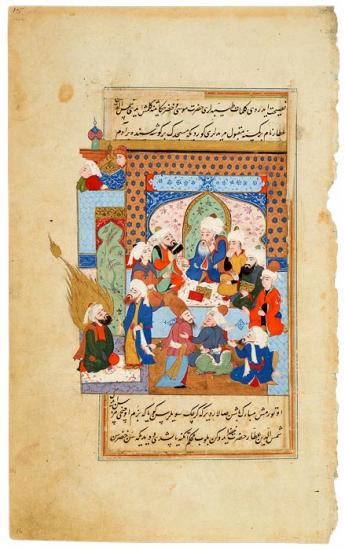
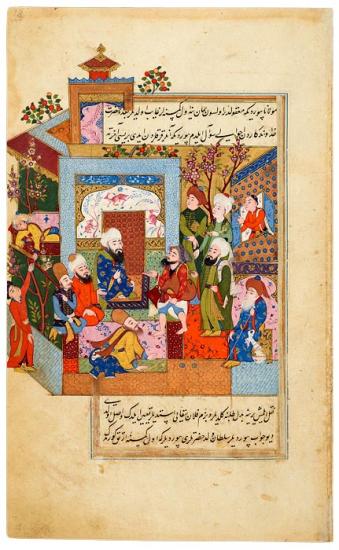
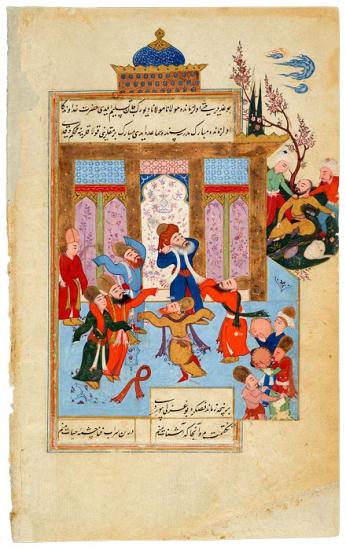
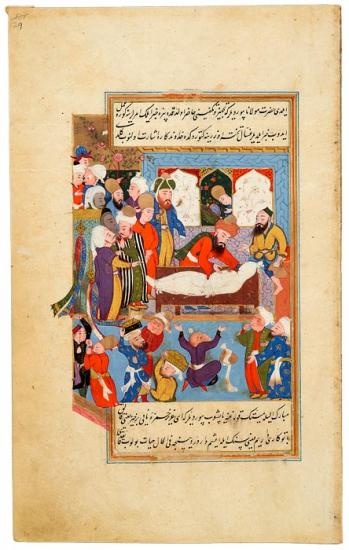

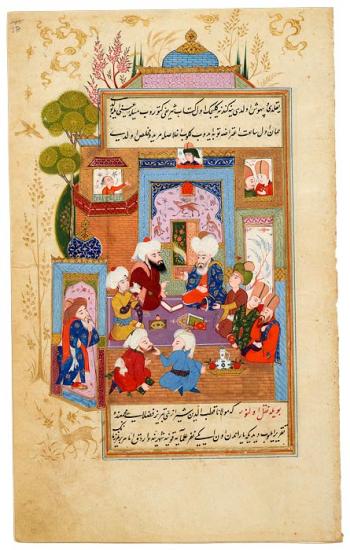
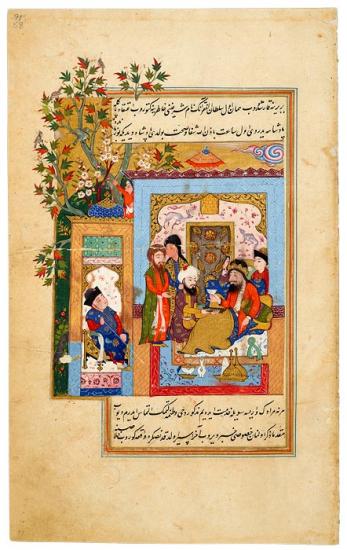
![A Water Monster Begs #Rumi Wife to Intercede for HimOutside Konya, Rūmī and his party camp by a river inhabited by [S]u Essā, "the lord of the water." Every year the monster drowns a person or animal from the neighboring community. After Rūmī jumped in the river to meet him... A Water Monster Begs #Rumi Wife to Intercede for HimOutside Konya, Rūmī and his party camp by a river inhabited by [S]u Essā, "the lord of the water." Every year the monster drowns a person or animal from the neighboring community. After Rūmī jumped in the river to meet him...](https://pbs.twimg.com/media/EYnPWm1WsAMvENo.jpg)
